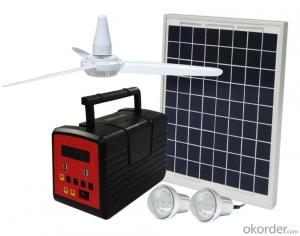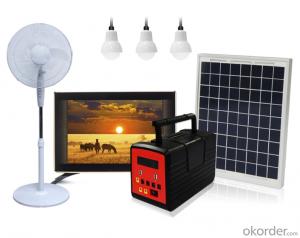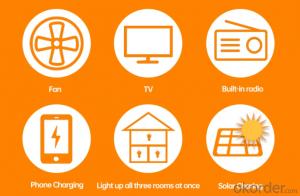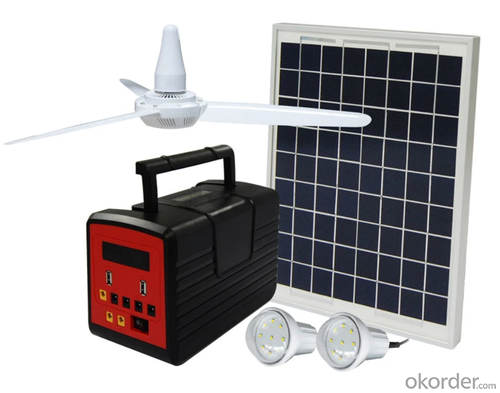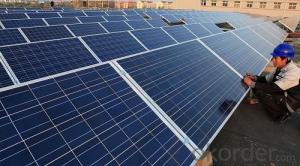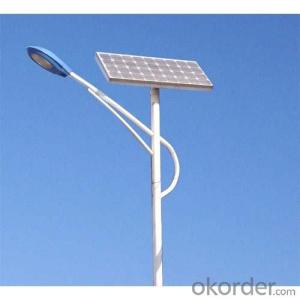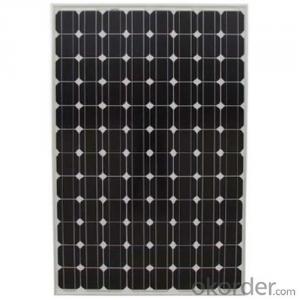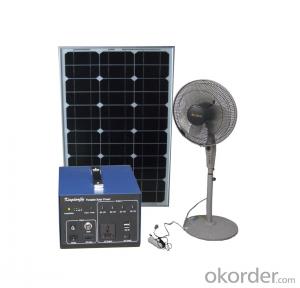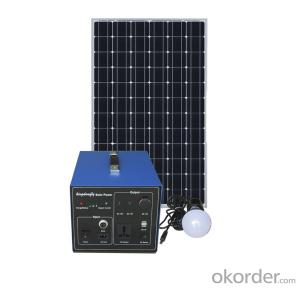Portable Solar Energy Systems with Big Solar Panel LED Light Product Radio MP3
- Loading Port:
- Shekou
- Payment Terms:
- TT OR LC
- Min Order Qty:
- 1 set
- Supply Capability:
- 500 set/month
OKorder Service Pledge
OKorder Financial Service
You Might Also Like
Specification
1. Description and specifications of Portable Solar Home Energy Power System with Big Solar Panel LED Light Product Radio MP3
Model NO. PS-K025L2
Battery: 11.1V/13000 mAh Li-ion
Bulbs: 3*3W with 5m Cable
Stand Fan: 16 Inch
Function:Lighting, Phone Charging, Radio, MP3, TV, Fan
Charging Time:6-8 H Under Sufficient Sunlight
Working Time: 14h for 3 Lamps; 22h for 2 Lamps; 43h for 1 Lamp
Accessories: 5-in-1 Charging Cable
2. Features of Portable Solar Home Energy Power System with Big Solar Panel LED Light Product Radio MP3
- All-in-1 DIY design, just need to plug & pla
- Multifunctional Lighting & 2 USB phone charger & TV & DC ceiling fan & FM radio and MP3
- 5*DC 12V output for powering different DC appliance
- Lighting up 3 rooms at the same time, max can connect 5 bulbs
- 2 DC Charging input to charge battery, by solar or electricity
- Battery indicator to show battery capacity to remind you charge in time
3. Pictures of Portable Solar Home Energy Power System with Big Solar Panel LED Light Product Radio MP3


4. Packages
Sea transport packages
- Q: Can solar energy systems be used for powering electric vehicle testing tracks?
- Yes, solar energy systems can be used for powering electric vehicle testing tracks. Solar panels can be installed alongside the track or on nearby structures to generate electricity. This renewable energy source can then be used to power the charging stations for electric vehicles, providing a sustainable and environmentally friendly solution for testing tracks.
- Q: Can solar energy systems be used for powering off-grid eco-industrial parks?
- Yes, solar energy systems can definitely be used for powering off-grid eco-industrial parks. Solar panels can be installed in these parks to harness the sun's energy and convert it into electricity. This renewable energy source is clean, sustainable, and abundant, making it an ideal choice for off-grid locations. By using solar power, eco-industrial parks can reduce their dependence on fossil fuels, lower their carbon footprint, and promote a more environmentally friendly and sustainable approach to industrial activities.
- Q: How long does it take to recoup the investment in a solar energy system?
- The time it takes to recoup the investment in a solar energy system can vary depending on factors such as the cost of the system, the amount of energy it generates, the local electricity rates, available incentives, and the individual's energy consumption. On average, it typically takes around 5 to 10 years to recoup the initial investment in a residential solar energy system. However, with decreasing equipment costs and increasing government incentives, this payback period is continually reducing, making solar energy a more financially viable option for many individuals and businesses.
- Q: Can solar energy systems be used in powering hotels or resorts?
- Yes, solar energy systems can be used to power hotels or resorts. Solar panels can be installed on the rooftops or open spaces of these buildings to harness sunlight and convert it into electricity. This renewable source of energy can provide a significant portion or even the entire power required for the hotel or resort, reducing reliance on traditional fossil fuel-based electricity and lowering operational costs. Additionally, solar energy systems can also be integrated with other energy-efficient technologies like energy storage systems and smart grids to ensure uninterrupted power supply and optimize energy usage.
- Q: Can solar energy systems be used for powering healthcare facilities?
- Yes, solar energy systems can be used to power healthcare facilities. Solar panels can be installed on the roofs or open spaces of healthcare facilities to generate clean and renewable electricity. This can help reduce dependence on fossil fuels and lower energy costs for the healthcare facility. Solar energy systems can power various equipment, including medical devices, lighting, heating, cooling, and ventilation systems, ensuring uninterrupted and sustainable energy supply for critical healthcare services.
- Q: Can solar energy systems be installed on roofs?
- Yes, solar energy systems can be installed on roofs. In fact, rooftops are one of the most common locations for installing solar panels. The main advantage of installing solar panels on roofs is that they utilize the existing space without requiring any additional land. Rooftop solar installations are also advantageous because they are usually unobstructed by shading from trees or buildings, resulting in optimal sun exposure for generating electricity. Additionally, rooftop installations are often cost-effective as they can reduce the need for long-distance transmission lines and can directly supply power to the building they are installed on. Overall, installing solar energy systems on roofs is a practical and efficient way to harness clean and renewable energy.
- Q: What is the difference between a solar power purchase agreement (PPA) and a solar lease?
- A solar power purchase agreement (PPA) is a contract between a homeowner or business and a solar provider, where the provider installs and maintains solar panels on the property. The homeowner or business purchases the electricity generated by the panels at a predetermined rate, typically lower than the utility's rate. In a solar lease, the homeowner or business leases the solar panels from a provider, paying a monthly fee for their use and the electricity they generate. Unlike a PPA, the homeowner or business does not purchase the electricity at a discounted rate but still benefits from reduced electricity costs and potentially lower upfront costs compared to purchasing the system outright.
- Q: Can solar energy systems be used for powering electric grids?
- Yes, solar energy systems can be used for powering electric grids. Solar energy systems, such as solar panels or solar farms, convert sunlight into electricity through the photovoltaic effect. This electricity can be used to power homes, businesses, and even entire electric grids. In fact, many countries and regions around the world are increasingly utilizing solar energy to meet their electricity demands and reduce reliance on fossil fuels. Solar energy systems can be connected to electric grids through a process called grid-tied or grid-connected systems. In this setup, the solar energy generated is first used to power local loads, such as homes or businesses. Any excess electricity is then fed back into the grid, allowing other consumers to benefit from the solar power. This is made possible through net metering, where the excess electricity is credited to the consumer's account and can be used when the solar system is not generating enough power, such as during nighttime. Large-scale solar power plants or solar farms can also be directly connected to electric grids to provide electricity to a wider area. These solar farms consist of numerous solar panels that generate electricity and feed it directly into the grid. They can be strategically located in areas with high solar irradiance to maximize energy production. Using solar energy systems for powering electric grids offers numerous benefits. First and foremost, it is a clean and renewable source of energy, reducing greenhouse gas emissions and mitigating climate change. Solar power also helps diversify the energy mix, reducing dependence on fossil fuels and increasing energy security. Furthermore, solar energy systems can be installed at various scales, from individual homes to large-scale power plants, making it a versatile solution for meeting electricity needs. However, it is important to note that solar energy is intermittent, meaning it is only generated during daylight hours and is subject to weather conditions. To ensure a stable and reliable power supply, energy storage technologies, such as batteries, can be integrated with solar energy systems. These batteries store excess energy during sunny periods and release it when the sun is not shining, allowing for uninterrupted power supply. In summary, solar energy systems can definitely be used for powering electric grids. With advancements in technology, decreasing costs, and increasing efficiency, solar power is becoming an increasingly viable and popular option for generating electricity and transitioning towards a more sustainable and cleaner energy future.
- Q: What are the different financing options for solar energy systems?
- There are several financing options available for solar energy systems, including purchasing the system outright with cash, taking out a solar loan, leasing the system, or entering into a power purchase agreement (PPA). Each option has its own advantages and considerations, such as upfront costs, ownership of the system, maintenance responsibilities, and potential savings. It is important to research and compare these options to determine which one aligns best with your financial goals and circumstances.
- Q: Are solar energy systems cost-effective?
- Yes, solar energy systems are cost-effective in the long run. While the initial installation cost may be higher compared to traditional energy sources, solar energy systems can save homeowners and businesses significant amounts of money on their electricity bills over time. Additionally, there are various government incentives and tax credits available that further enhance the cost-effectiveness of solar energy systems. Furthermore, solar energy is a renewable and clean source of power, reducing reliance on fossil fuels and benefiting the environment.
Send your message to us
Portable Solar Energy Systems with Big Solar Panel LED Light Product Radio MP3
- Loading Port:
- Shekou
- Payment Terms:
- TT OR LC
- Min Order Qty:
- 1 set
- Supply Capability:
- 500 set/month
OKorder Service Pledge
OKorder Financial Service
Similar products
Hot products
Hot Searches
Related keywords
